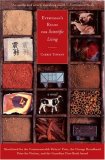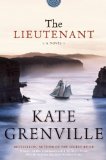Summary | Excerpt | Reviews | Beyond the book | Read-Alikes | Genres & Themes | Author Bio

A Novel
by Carrie TiffanyThe government "Better Farming Train" brings advice to the small towns of Australia. The train is staffed by irresistibly eccentric agricultural and domestic experts; and when two of the train's experts fall in love, in an atmosphere of heady scientific idealism they settle in the impoverished Mallee farmland with the ambition of transforming the land through science.
In this sensual, witty, and startlingly original first novel, Jean Finnegan
searches for her place in a tumultuous world wracked by the Great Depression and
the beginning of World War II. Carrie Tiffany captures the frailty and beauty of
the human condition and vividly evokes the hope and disappointment of an era.
Billowing dust and information, the government "Better Farming Train" slides
through the wheat fields and small towns of Australia, bringing advice to the
people living on the land. The train is staffed by irresistibly eccentric
agricultural and domestic experts, from Sister Crock, the prim head of "women's
subjects," to Mr. Ohno, the Japanese chicken specialist, to Robert Pettergree, a
scientist with an unusual taste for soil. Amid the swaying cars full of cows,
pigs, and wheat, a strange and swift seduction occurs between Robert and Jean.
In an atmosphere of heady scientific idealism they settle in the impoverished
Mallee farmland with the ambition of transforming the land through science.
In luminous prose, Tiffany writes about the challenges of farming, the
character of small towns, the stark and terrifying beauty of the Australian
landscape, and the fragile relationships among man, science, and nature.
Everyman's Rules for Scientific Living is a passionate and heartbreaking
novel from an astonishing new writer.
Throughout, Tiffany (an agricultural journalist living in Melbourne) explores the themes of man against nature, and the nature of man against man, but she also captures a big slice of social history, illustrating the incredible hardships of the time - the great depression, extensive years of drought, the memories of one war still present and the impending onset of another - stories that are at one level uniquely Australian but at another level, totally universal...continued
Full Review
 (209 words)
(209 words)
(Reviewed by BookBrowse Review Team).
The Better Farming Train did exist just as described in Everyman's Rules for Scientific Living; it steamed out of Melbourne for the first time in October 1924 and returned for the last time in 1935, making about 38 tours in total. At each of its 10 stops between 500 to 2000 farmers and townspeople would attend the exhibits. You can browse a range of pictures of the train and its destinations here. In the top left you'll see the words "Browse Photo Collection" in red. Click any of the numbers underneath to see photos (we thought this a particularly fine image)
Robert and Jean set up home in the Mallee, a district in far north-western Victoria, south of the Murray River (the state of Victoria is in the south-east of Australia). The ...

If you liked Everyman's Rules for Scientific Living, try these:

by Kate Grenville
Published 2010
Winner of the Christina Stead Prize for Fiction, Kate Grenville's The Lieutenant - a stunning follow-up to her Commonwealth Writers' Prize-winning book, The Secret River, is a gripping story about friendship, self-discovery, and the power of language along the unspoiled shores of 1788 New South Wales.

by Cate Kennedy
Published 2008
Devastating, evocative, and richly comic, Dark Roots deftly unveils the traumas that incite us to desperate measures and the coincidences that drive our lives. This arresting collection introduces a new master of the short story.
We must believe in luck. For how else can we explain the success of those we don't like?
Click Here to find out who said this, as well as discovering other famous literary quotes!